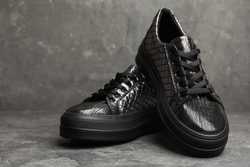- Sizes: S - 4XL
- Weight: 600g
- Insulation: Yes (100% polyester)
- Price at time of publish: $200
Best Men's Ski Pants for Styling Your Way Down the Slopes
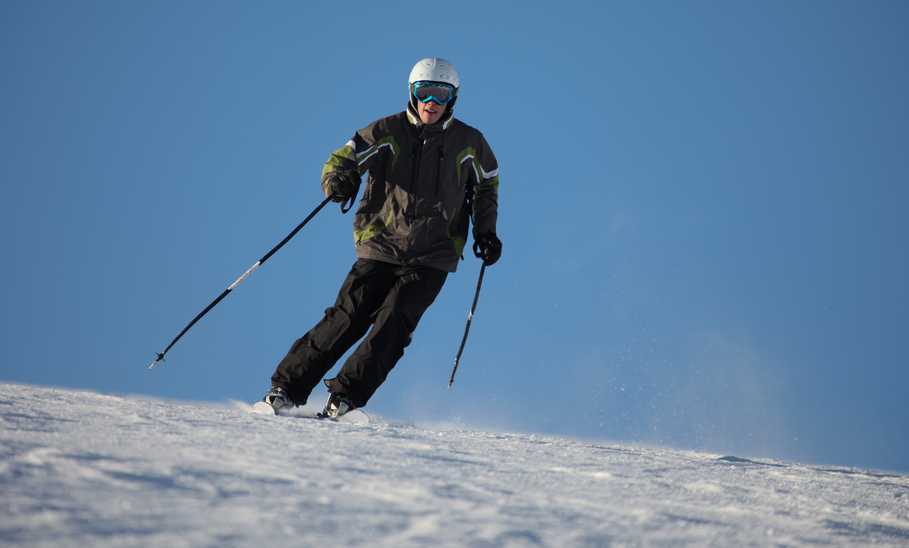
Our evaluations and opinions are not influenced by our advertising relationships, but we may earn a commission from our partners’ links. This content is created by TIME Stamped, under TIME’s direction and produced in accordance with TIME’s editorial guidelines and overseen by TIME’s editorial staff. Learn more about it.
You’ve booked your trip, waxed your skis or board, tooled up with the best sunglasses for men, and your hat game is on point. But what about your ski pants? If you’re long overdue for a new pair, or are hitting the slopes for the first time, check out our picks for the best ski pants for men. Make the wrong choice and things will go downhill very quickly (this will also happen if you get it right, being skiing, but let’s move on).

For those with a terror of getting chilly legs, go for ski pants with a little extra insulation. “The Helly Hansen Legendary Pants have just the right amount of insulation to make it a great resort skiing pant,” says Manville. “It’s not overly bulky, providing the option to layer, and it’s a good price point that provides good quality without feeling over the top.”
A waterproof, windproof, insulated ski pant available in a rainbow of colors.
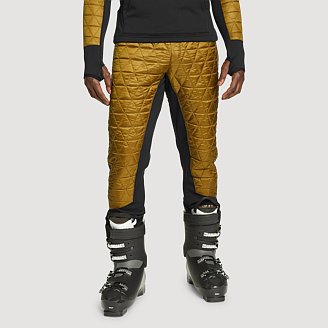
Skiing is an expensive hobby, and while you certainly don’t want to skimp on the important stuff (staying warm and dry is kinda vital), it’s possible to spend less without dooming yourself to a miserable time. “Any time you have a quality product with a more affordable price tag is always a win, and these pants are most certainly a win!” says Charles Fratto, style director for ILOE Studios, who recommends these pants that feature breathable fleece, stretch fabric, and an athletic fit.
An inexpensive but functional pair of ski pants, ideal for those who don’t make the trip to the slopes too often.
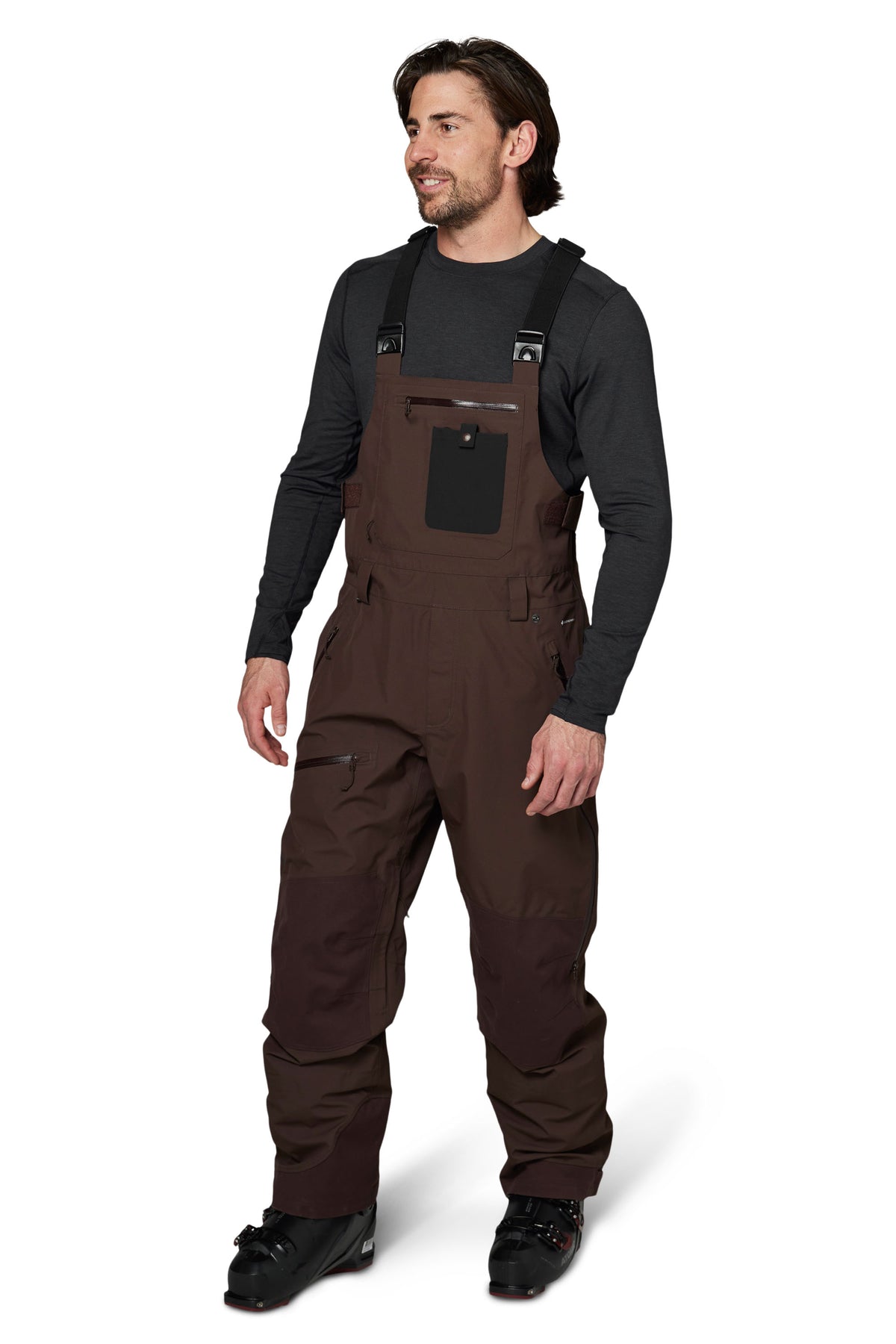
As Manville notes above, a ski bib is a great option for those looking for pants that will stay in place all day, while handily keeping your chest and back that little bit warmer, too. Kelly Evans, CMM of men's and youth apparel at Christy Sports, recommends the Baker Bib from Colorado’s Flylow, citing its cool colors and useful tech as the reasons to give them a whirl. Fratto is also a fan, adding that, “A high bib and plenty of insulation gives these ski pants the edge for your next adventure in the backcountry.”
A high-tech, super practical ski bib for those who want to make sure the snow stays out of their pants.

“These bibs offer a waterproof, breathable shell but are super comfortable, with added stretch,” says Manville. “They provide all the features needed for the skier that prefers backcountry touring. Bibs were chosen here for the added features–and snow protection for powder days—but they also come in a pant if preferred.”
A lightweight, stretchy bib to keep you protected as you zoom down those backcountry runs.
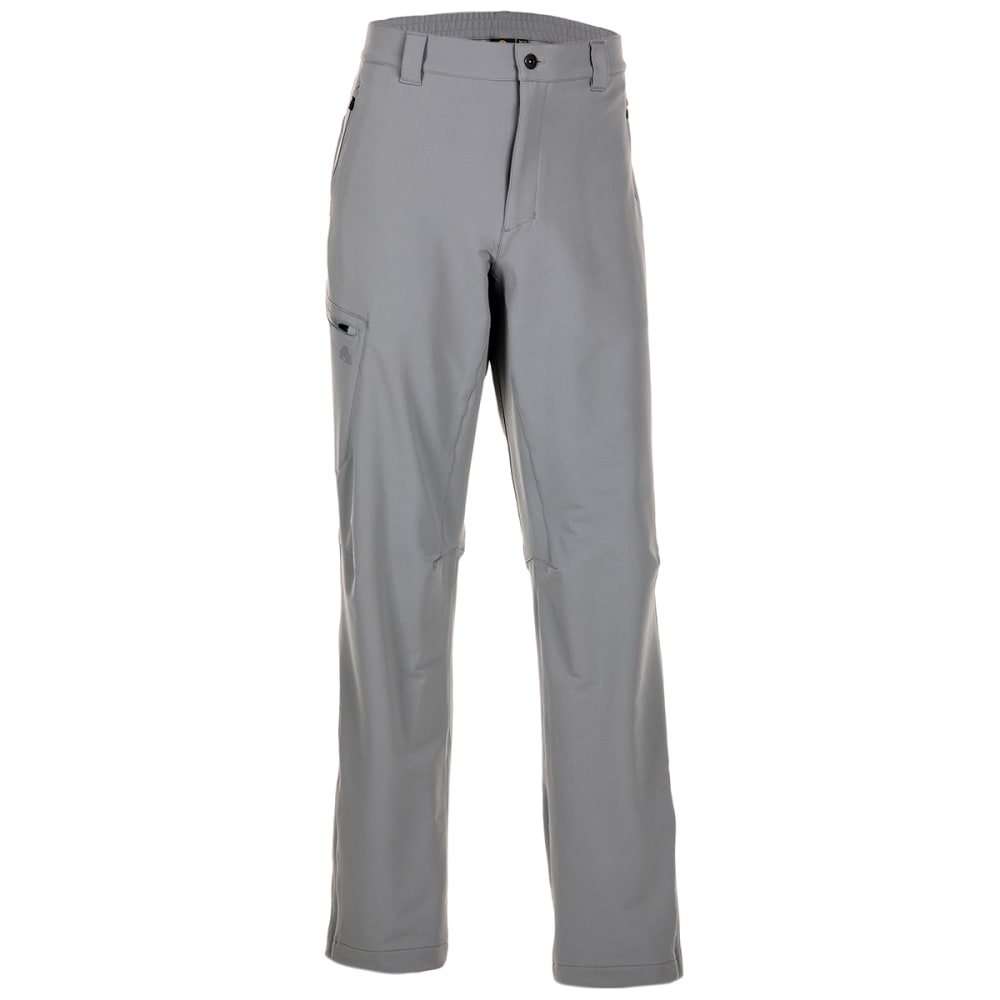
“The best softshell pants may not have some of the features of a true alpine ski pant, such as the boot gaiter, but they’re a crossover for multiple activities,” explains Manville. “The Pinnacle is a tried and true durable softshell with stretch and water repellency that can work across a multitude of winter activities, including skiing, touring, Nordic skiing, snowshoeing, hiking, and ice climbing.”
A versatile and lightweight option for a variety of outdoor winter activities.
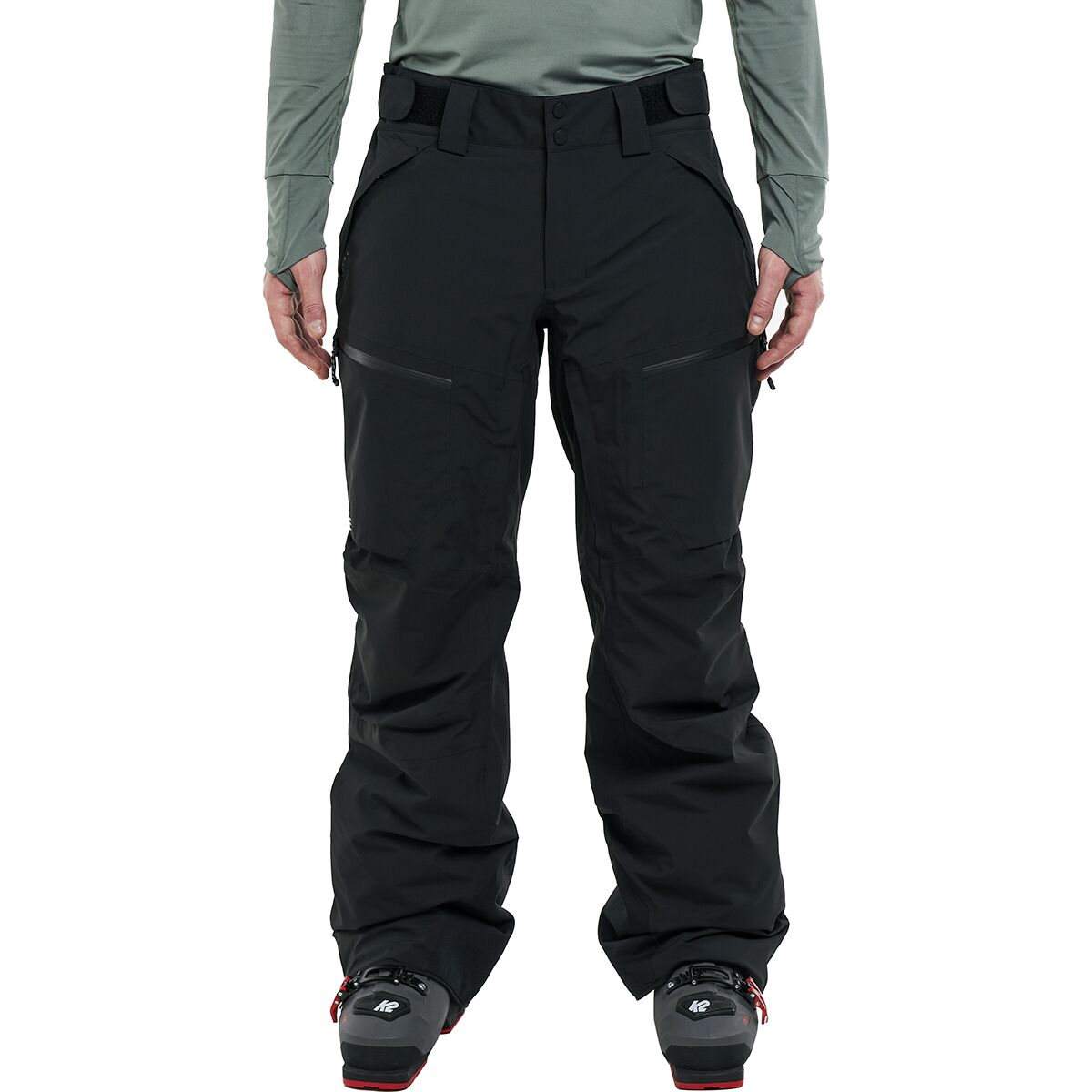
Style is subjective, obviously, but for Fratto, these insulated pants from Orage are a winner. “Lightweight and with just the right amount of added stretch, these pants look great on just about any silhouette while still maintaining the best windproof, waterproof, and snowproof qualities,” he enthuses.
A good-looking ski pant that doesn’t sacrifice any practicality whatsoever in the name of style.

It can be easy to get hot while zooming around a mountain, so it’s good to look for ski pants that won’t leave you sweating. “These are a great breathable option,” says Manville. “For breathability, you most likely are going to want a shell pant with a waterproof/breathable membrane, as well as zips for ventilation, so it’s no surprise that a pant designed for ski touring would be very breathable.”
For pants that will let you power down the slope without trapping all the sweat you work up, these are an ideal and reasonably priced option.
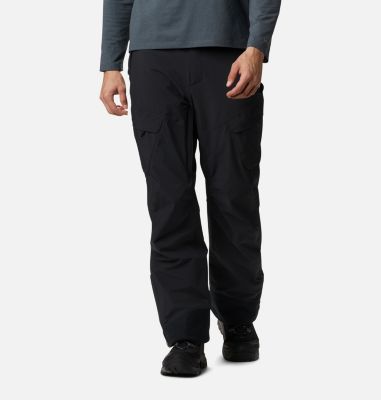
Is there any sport that requires extra pockets as much as skiing or boarding? Gloves, hats, sunglasses, goggles, lift passes, the list goes on! “If you want the extra pockets, check out styles like the Columbia Powder Stash, featuring two zippered pockets and two cargo pockets that are great for easy access to things like extra hand warmers, goggle wipes, tissues, trail maps, or snacks,” says Manville. You can also count on Columbia for the best winter jackets and coats for men and the best winter boots for men, off the slopes.
A comfortable, waterproof pair of ski pants that’ll hold just about anything you need them to.

“The North Face Freedom Insulated Bibs are a great option for kids,” says Manville. “Bibs are important for warmth and snow protection–look for adjustability so they can last multiple seasons as the kids grow.” Fratto concurs, adding that, “Combining DryVent and Heatseaker insulation makes these ski pants for kids a go-to option for having fun on the mountain while staying warm and dry.”
A perfect way to keep your kiddos warm, dry, and comfortable, whether they’re hitting the slopes for the first time, or have been skiing since before they could walk.
“The first thing to consider is where you ski and how you intend to use the pants,” says Laurel Manville, product development manager at Eastern Mountain Sports. “For resort skiing where you’ll be riding the lift most of the time, you may opt for something slightly insulated to keep you warmer. If you do sidecountry or backcountry skiing where you may be hiking and working up a sweat, you may opt for a shell pant where you can vary your layering underneath and vent as needed.”
Manville advises that the next decision is whether to go with a normal pant or a bib pant. “Bib pants look like overalls and have a piece that comes over your chest and back with shoulder straps–they’re a great option to prevent any snow from getting between your pants and jacket,” she says. “They also provide an added layer of warmth on the chest and back. With bibs, you don’t risk them falling down and you don’t have any pressure at your waist, which makes for great ease of movement.”
Manville suggests that whatever style you opt for, you need to make sure the pants you buy are both waterproof and breathable. “Look for ratings such as 10k or higher,” she says. “This will keep you comfortable in the changing conditions of our current climate.” In terms of waterproofing, this number indicates the amount of rain the material can withstand without letting any moisture through, i.e., 10,000mm. Breathability is measured by the amount of moisture by weight that can pass through a square meter of fabric in 24 hours, and as far as Manville is concerned, the higher the number, the better.
Manville recommends looking for the following features in ski pants:
“Features and material quality can all play a role in price,” says Manville. “If you’re a beginner skier and may only go a handful of times, you may not want to invest in something super expensive. If you’re a hardcore skier going every weekend, you want a pair of pants (or two!) that are going to last for seasons on end. I, personally, ski at least 50 times a year and have had pants for ten-plus years, so it's worth the investment if you plan on it being a lasting activity. As a ski instructor, I know that comfort can make or break your experience–regardless of skier ability–so having a pair of pants that keeps you warm and dry is critical to enjoying the sport!”
Our selections were made through a mix of personal experience, thoughtful advice from our panel of outdoor sports and style experts, and ensuring every pick has overwhelmingly positive customer reviews, especially in terms of comfort, longevity, and practicality.
“It depends on the temperature and the type of pants,” says Manville. “Most people add a base layer under ski pants for a softer feel. When skiing, it’s important not to have anything in the boot except for socks and feet, so look for a base layer that may be more knee length, so you don’t have the bunching up of extra layers.”
“What and how much you layer may depend on personal preference,” she continues. “If it’s really cold, I’ve been known to layer both a wool base layer and down knickers underneath a shell pant. Or if it’s warm spring skiing, you may just go with shorts or briefs under the ski pants to keep from overheating. But, this is where zippered ventilation can also come into play.”
“It’s important to follow the manufacturer’s washing instructions for the best longevity of your pants,” says Manville. “Most of these types of product will have a waterproof/breathable membrane and a DWR (durable water repellency) treatment applied. Because of that, it’s recommended to wash on a low temp with a ‘tech wash’ special detergent if possible, then dry on a low temperature. When needed, the DWR can be reapplied with an aftermarket spray such as Nikwax.”
“Ski pants are not only worth it, they’re a necessity,” says Fratto. “You want to stay warm while you’re on the mountain and ski pants are designed to ensure you safely maintain your body temperature. But just because it’s a utilitarian garment doesn’t mean that you can’t add your own style to the mix–there are many options available and you can find a pair that fits both your purpose on the slopes and your personality.”
“It all depends on what’s comfortable to you,” says Evans. “Some people like a more trim fit and others more baggy. There are a variety of choices out there, from stretch pants to the very trendy baggy fit. I would always air on the side of slightly more loose than slightly too tight if you’re in between, as this leaves room to layer.”
For options to layer under your ski clothes, be sure to check out our guides to the best sweatpants for men and the best hoodies for men, too.
“In my mind, ski pants are a little slimmer [than snow pants] and built for the swoosh,” opines world traveler and Scandinavian outdoor expert Nate Axvig.
Manville adds that, “A snow pant can be insulated and waterproof or water resistant, but without some of the features for skiing. You definitely want some of the features [listed up top] to help improve your skiing/boarding experience.”
The information presented here is created by TIME Stamped and overseen by TIME editorial staff. To learn more, see our About Us page.



